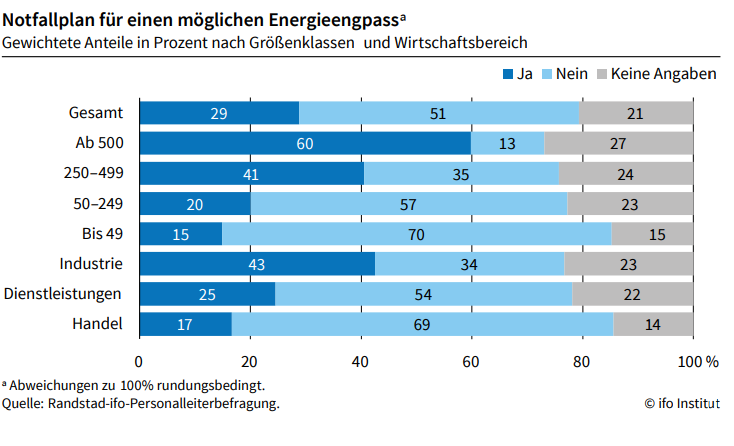
Companies an municipalities lack precautions for energy crisis
Recent surveys appear to prove that a significant number of companies do not have any emergency plans to stay afloat in the middle of a crisis. Another study reached the same conclusion in the case of municipalities.
The energy crisis in Europe has kept companies in a tense situation for months, with many of them having no plans whatsoever in case the country’s energy supply drew to a halt abruptly. Smaller companies have particular issues with planning. Germany, for example, is faced with a huge problem,
as only one third of the companies have an emergency plan to tackle the energy crisis, according to survey by the Ifo Economic Research Institute. The study also reveals that smaller companies in particular have problems with planning: the smaller the company, the less frequently tit initiates precautionary measures.
60 per cent of companies with more than 500 employees have taken appropriate precautions, whereas only 15 per cent of the companies employing no more than 50 people have done so.
The situation of actors in the various sectors of the economy is also quite different.
The energy crisis is the most serious in the industrial sector, with only 43 per cent of the companies being prepared for a severe supply crisis. The problem is even worse for service providers, as only 25 per cent of the sector’s companies have adopted some kind of emergency plan. However, commerce is currently in the worst situation, given that only a total of 17 per cent of the firms have emergency plans at hand.

https://www.ifo.de/publikationen/2022/aufsatz-zeitschrift/human-resources-zwischen-energie-und-coronakrise
A longer power outage would bring life to an almost complete standstill, and not just in the economy. In peacetime, the federal states are in charge of disaster prevention in Germany. Protecting citizens is a task delegated to settlements, small regions and independent cities. Just like businesses, a significant proportion of municipalities do not have an emergency action plan. Between the beginning of September and early October, one of the political magazines on the German public media conducted a survey, involving about 200 settlements.
When asked whether their local public administration possessed a contingency plan in the event of a power outage, 101 municipalities provided a negative answer. In other words, half of the municipalities – including big cities like Heilbronn, Braunschweig or Mainz – would be helpless, if there was a blackout for a longer period.
In the event of a longer power outage, the drinking water supply may also collapse, because after a certain time, the pumps of the water works may fail without electricity. There are so-called emergency wells to supply water in such scenarios, but 78 out of the municipalities asked in the survey said they had no emergency wells installed in their respective regions or cities.

